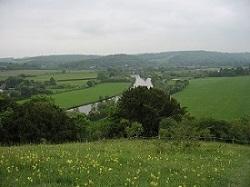Ecological Consultants

Thames Valley Environmental Records Centre (TVERC) are the environmental records centre for Berkshire and Oxfordshire. We offer a range of services for ecological consultants. Our ‘one-stop shop’ data services are the most efficient way of finding out all the available information about the ecology of the area you are studying. Our data helps you decide what ecological surveys are required, and plan for these effectively, saving you time and money.
Find out more about our Data Search Service
Why request data from TVERC?
We collect data from professional and volunteer surveyors, which are carefully checked before integration into our main database so that we can provide information of known quality in a format that suits our customers.
We can provide you with data about species, habitats, wildlife & geological sites and ecological networks in Berkshire and Oxfordshire. Our reports are specifically designed to ensure that a comprehensive suite of data is supplied to enable you to demonstrate best practice in your assessments and more readily target and commission new survey work to make informed planning and development decisions in relation to ecological impact.
No other organisation, including the NBN, can provide you with this information. Our database currently includes over 4.5 million species records. We have regular contact with around 70 national and local recording groups and numerous individuals, who allow us to include their data on our database. We hold data on all species groups, including over 1,160,000 bird records, over 1,022,000 plant records, 32,300 bat records, 5,800 badger records, 6,200 great crested newt records and in 2020 we added over 477,000 records to our database.
Ecological Survey Reports for Planning Applications
Environmental consultants should be aware that we have advised all the planning authorities in Berkshire and Oxfordshire that ecology reports submitted as part of a planning application should include a data search from TVERC (with the exception of planning applications where it has been agreed with the planning authority that no data search is required because there will be no impacts on biodiversity). This approach is supported by CIEEM, the National Biodiversity Network (NBN), the Association of Local Government Ecologists (ALGE) and the Association of Local Environmental Records Centres (ALERC). More detailed guidance is available in the CIEEM 'Guidelines for Accessing and Using Biodiversity Data' and our website page on Ecological Survey Reports for Planning Applications.

What does TVERC provide?
Standard biodiversity reports are supplied within 3 working days of receiving a completed online form. Our charges are carefully set at a rate to ensure we can continue to provide a service now and into the future for the benefit of our environment.
The charge is shown within the online form, or you can use our data request cost calculator.
Sharing your data with TVERC
Data collected by ecological consultants is of a high standard and often of protected and notable species. If we received all the data collected by ecological consultants, our database would be even more useful to you than it is now.
Why share your records?
- We are a ‘not for profit’ organisation so rely on receiving data from every source possible to improve our database of environmental information.
- Our database will be even more useful for you when planning surveys.
- Your records will help protect and enhance local biodiversity and geodiversity by increasing the quality and quantity of data we hold.
- You will meet BS42020 and CIEEM guidelines for best practice.
To make this easier for us, you could ensure that all ecological survey reports include survey data in a table with the information we need so the data can be easily extracted and added to our database. Even better, you could send us an Excel spreadsheet at regular intervals containing all of your records. You can find out more on how to share your records here. We continuously check and upload data into our database so you could send it to us at any time of year.
Tip - Choose one or two months of the year which would suit your work programmes to send us the data, so that we know when to expect the data, and you can plan ahead.




